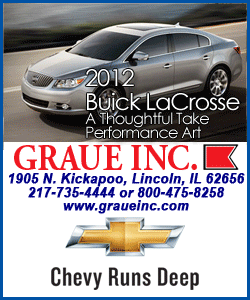 The committee is working to create a master plan on how the downtown
area can be improved to become more marketable to prospective
businesses and more user-friendly for those who visit the area. The committee is working to create a master plan on how the downtown
area can be improved to become more marketable to prospective
businesses and more user-friendly for those who visit the area.
The group is working under the direction of the city of Lincoln and
is using a portion of the $650,000 grant the city received this year
for planning such an overhaul of the downtown area.
In February of 2010, the city applied for a grant through the
Illinois Department of Commerce and Economic Opportunity. In January
this year, the city received word that it had been awarded the
grant, which amounted to $650,000. The award also came with a
$100,000 matching requirement. The city of Lincoln will have to
provide the match, and the total amount to be spent will then come
to $750,000.
The grant specified that the money should be used for developing
a revitalization plan, and there were also provisions to use a
portion of the money for fašade improvement and to address safety
issues in the city.

When the grant was awarded, some of the discussion in the city
council chambers included the fact that having a written plan would
be an asset in winning future grants that could actually be used to
implement the plan. In addition, if the city continues to go forward
with a TIF district, money earned through that program can be
applied to implementing portions of the plan.
When the grant was awarded, a steering committee was appointed to
work on the project. In June that committee -- represented by
Patrick Doolin, Seth Goodman and David Lanterman -- brought to the
city a progress and recommendation report. Included in the report
was a chart outlining how the grant would be spent.
The chart indicated 10 percent would be spent on a downtown
redevelopment plan, 16 percent on a downtown revitalization plan, 6
percent would be for fašade improvements and historic preservation,
5 percent would go to a downtown traffic and parking study, and 1
percent would go to Prairie Engineers as the grant managers.
This week the city also approved another $16,500 for a study on
incorporating fiber-optic Internet into the downtown area. Forgy had
brought this to the city council, saying that it was something they
wanted to do in the future, and incorporating this study and plan
into the revitalization program would bring them one step closer to
being able to do it.
Tuesday evening Forgy offered some of the history behind the
revitalization process and talked about what had taken place over
the previous two days in the workshops.
He defined the study area as being a 25-block area with rough
boundaries of Decatur Street to the south, Hamilton to the east,
Tremont on the north edge and Logan on the west.
Forgy said the group is developing two primary plans with other
smaller plans incorporated into them

The first is a redevelopment plan. This is a long-range strategic
plan that looks into the future and addresses what Lincoln should
look like in years to come.
The second; the revitalization plan, addresses the more immediate
needs of the community. He said this would be a plan to make
downtown more appealing and would help move the city toward what it
wanted in the redevelopment plan.
As the primary consultants, Prairie Engineers is responsible for
hiring other specialists and consultants to advise the steering
committee on the needs of the city.
Forgy named several people the committee has been working with,
including Kent Massie, PLA, ASLA, and Sue Massie, APA, of Massie
Massie and Associates in Springfield. Massie is a landscape
architect and has been working on plans for the county parks and
courthouse as well as landscaping and green space planning for
downtown.
[to top of second column] |

Ian Colgan, AICP, Development Concepts Inc., Indianapolis, Ind., is
an urban planner and is doing market studies and business analysis
for the plan.
Keddy Hudson, AIA, Kennedy Hudson and Associates, Monticello, is
a historical architect who is doing a fašade analysis of the
downtown area.
Kurt Bialobreski, P.E., PTOE, Hanson Professional Services Inc.,
Peoria, is conducting studies on traffic, and Ryan Nation, P.E.,
Hanson Professional Services Inc., Springfield, is working on
lighting.
Forgy turned the floor over to Colgan, who had spent the last two
days in Lincoln working with the workshop participants.
Colgan said his primary role was to help develop a strategic
approach to everything the committee wanted to accomplish in the
redevelopment plan.
He said the workshops of the last two days had wrapped up the
first phase, the current conditions analysis. He said the
presentations Tuesday night were from what he had learned in the
workshops.
He said the first step was a perception survey. Approximately 40
people participated in the survey. They were asked to score a
specific statement in a range of 1 to 5, with 1 being "strongly
disagree" and 5 being "strongly agree."
In response to comments that said Lincoln is easy to get to, easy
to navigate around and a good walking environment, the average
scores came in a range between 3.3 and 3.8. Not surprisingly the
comment that it is "easy to find parking" received a score of only
2.6.

Colgan said parking in the city was an obvious issue that had
come up in every workshop, whether it was actually a part of that
topic of not. He said it was obvious that this was a downtown issue
that the plan needed to address.
The surveys also indicated the downtown area needed more
shopping, more dining choices, more entertainment, plus improvement
to the sidewalks, more trees and benches, and improvements to the
two county parks.
Everyone agreed that the downtown area needed to be the center of
the community. In all the surveys the highest scoring comment was
that the downtown area has great potential. With 5.0 indicating
"strongly agree," that comment averaged a score of 4.7.
In the comment that historic buildings should be preserved at all
costs, the score came in much lower at 3.8. Colgan said he had
included the phrase "at all costs" because preservation of historic
buildings can be a touchy issue. And this differs from the comment
that the city should preserve its history and character, which
scored higher. He said there could be some opportunity for downtown
improvement that doesn't stick to the letter of the law on historic
preservation but would still enhance and preserve the history and
character.
Colgan said the survey gave him a good sense that there is a lot
of potential for downtown and that it can be a lot more than it is.
___
This concludes the first portion of the report on the Tuesday
night public meetings on downtown revitalization. In the next
segment Colgan will start with a discussion of developing a
strategic plan for downtown Lincoln.
[By NILA SMITH]
Past related articles
|